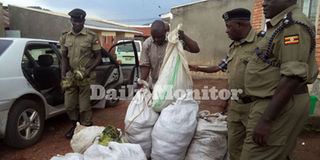Crackdown on drugs should be sustained

Policemen during a drug crackdown. FILE PHOTO
What you need to know:
The issue: Crackdown on drugs.
Our view: We hope that this action will not be a one off but that the open and underground trafficking of drugs will be given a decisive blow.
The police on May 15 carried out a crackdown on sellers of what is widely thought to be aviation fuel to street children, ending years of inaction on a menace that continues to openly plague major towns across the country.
The devastation visited on consumers, especially the sniffing of fuels and glue, has caused on street children is well documented. Anyone in doubt needs to visit slums of Kampala, especially Kisenyi.
The force reported that two women had been arrested with 23 litres of what it said is aviation fuel after a directive by the police leadership to fight drug cartels within the Kampala Metropolitan Area.
We hope that this action will not be a one off but that the open and underground trafficking of drugs will be given a decisive blow.
This newspaper investigated the source of the so-called aviation fuel. The results, contrary to the widely held belief, showed that what is sold on the streets is Toluene (methylbenzene, toluol, phenylmethane) an aromatic hydrocarbon commonly used as an industrial solvent for the manufacturing of paints, chemicals, pharmaceuticals, and rubber.
The tests and analysis were conducted by government scientists at the Uganda Industrial Research Institute from samples we bought from Kisenyi, a hub for drugs.
It is found as an ingredient in gasoline, acrylic paints, varnishes, lacquers, paint thinners, adhesives, glues, rubber cement, airplane glue, and shoe polish. At room temperature, toluene is colourless, sweet smelling, a volatile liquid.
Dealing in Toluene is lucrative for the dealers but that is not the only issue. It is not only cheap but available on the open market and worse, it is unregulated.
As police cracks the whip, we also hope that hard questions will be asked of police officers who man the posts and stations in the areas where such chemicals are sold.
Our investigation revealed a symbiotic relationship between local authorities, the police and the dealers. In fact, we were told, that every weekend, the dealers in fuels, heroin and cocaine, pay a stipend to the area local police and other local leaders in a system called “reporting”. The same authorities, we were informed tip off the dealers beforehand when an operation is ordered.
We also call upon government to address the challenges that have since been identified in the Narcotic Drugs and Psychotropic Substances (Control) Act (NDPSA) which President Museveni assented to on April 9, 2015.
It is also time government agencies with the mandate to fight this did their job.




